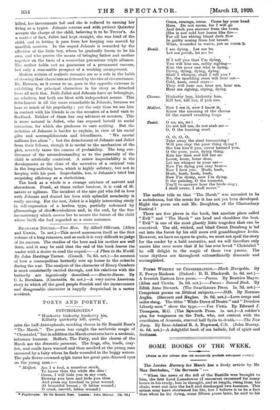" Hunkutty hinkutty hunkutty hie, Killutty quickutty kffi, quick," cries
the half-Aristophanic, mocking chorus in Sir Ronald Ross's " The Marsh." The poem has caught the authentic magic of " Christabel," but in addition the Marsh creatures have a sardonic, inhuman' humour. Melfort, The Fairy, and the chorus of the Marsh are the dramatis personae. The frogs, efts, toads, cray- fish, and snails have warned and then mocked at the young man ensnared by a fairy whom he finds wounded in the boggy waters. The pale flower-crowned sylph turns her great pain-dimmed eyes on the young man :- " Melfort. Am I a fool, a senseless stock, To haver thus the while she dies ! Come, I will hide you in my coat, Enwrap you here and hide you thus And press my kerchief to your wound. (0 beautiful breast ; 0 bitter wound ; 0 cruel, carved, bitter wound.) • Pewchousnes. By Sir Ronald Ben. London: John Murray. 1i. dd.]
Come, courage, come. Come lay your head Here. Do not moan, for I will go
And fetch you succour from the town. (She is not cold but burns hice fire—
For all her ebbing blood doth flow In guilty oozing from her breast. What, wounded in water, yet so warm !).
Zooid. I am dying. Let me be. Let me perish, let me be.
If I tell you that I'm dying, You will kiss me, softly sighing— Kiss the poor one who is dying, Dying, dying, dying, dying. Shall I whisper, shall I tell you ? No, the sparkling stars will hear me— Cold, keen, cruel stars— They will hear me, hear me, hear me, Hear me sighing, crying, dying. Chorus. Hinkutty• boy, hinkutty han, Kill her, kill her, if you can. Melfort. N▪ ow I s▪ ee it, now I know it,
Know the meaning of the chorus Of the cursed croaking frogs.
!maid. Ono, no, ▪ no I Do not kill me, do not stab me- 0, 0 the burning steel.
0, 0, 0, 0, Take away the steel tormenting !
Will you slay the poor thing dying
She has kiss'd you, never harmed you,
0 the poor, poor, dying thing.
Kiss her then and kill her so.
Lover, lover, lover dear,
Let me whisper in your ear— Now I'm dying you may hear—
Now I love you. Hush, hush, Hush, hush, hush, hush, Now I'm dying, now I'm dying. 0 the paining, 0 the torment. You'll to-morrow hear the birds sing ;
I shall never, I shall never."
The author tells us that "The Marsh" was intended to be a melodrama, but the music for it has not yet been developed. Might the poem not suit Mr. Boughton, of the Glastonbury Festival ?
There are five pieces in the book, but another piece called " Evil " and " The Marsh " are head and shoulders the best. " Evil " is one of the most ghastly little tragedies that can be conceived. The old, wicked, and blind Count Dansberg is led out into the forest by his still more evil granddaughter Iselin. However, we have no space to quote, we must not spoil the story for the reader by a bald narrative, and we will therefore only assure him once more that if he has ever loved " Christabel " he will delight in the magic of these two yoems. The verse rhythms are throughout extraordinarily dramatic and accomplished.










































 Previous page
Previous page